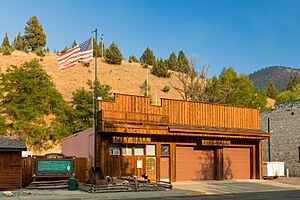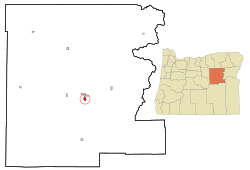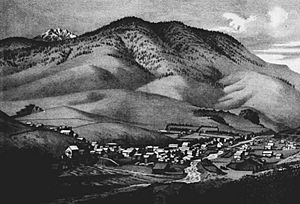Canyon City, Oregon facts for kids
Quick facts for kids
Canyon City, Oregon
|
|
|---|---|

City hall
|
|

Location in Oregon
|
|
| Country | United States |
| State | Oregon |
| County | Grant |
| Incorporated | 1891 |
| Area | |
| • Total | 1.41 sq mi (3.65 km2) |
| • Land | 1.41 sq mi (3.65 km2) |
| • Water | 0.00 sq mi (0.00 km2) |
| Elevation | 3,179 ft (969 m) |
| Population
(2020)
|
|
| • Total | 660 |
| • Density | 468.75/sq mi (181.00/km2) |
| Time zone | UTC-8 (Pacific) |
| • Summer (DST) | UTC-7 (Pacific) |
| ZIP code |
97820
|
| Area code(s) | 541 |
| FIPS code | 41-10950 |
| GNIS feature ID | 2413162 |
Canyon City is a small city in Grant County, Oregon, in the United States. It is the main town, or county seat, of Grant County. The city is located about 2 miles (3.2 km) south of John Day along U.S. Highway 395. In 2010, about 703 people lived there.
Contents
About Canyon City
Where is Canyon City?
Canyon City is found along U.S. Route 395. It is about 2 miles (3.2 km) south of the city of John Day. The John Day River and U.S. Route 26 are also nearby. The city is about 150 miles (240 km) east of Bend and 266 miles (428 km) southeast of Portland.
The city sits at an elevation of about 3,200 feet (980 m) above sea level. If you travel south from Canyon City towards Burns on Route 395, you will pass through parts of the Malheur National Forest. The city covers an area of about 1.41 square miles (3.65 square kilometers), and all of it is land.
What's the Weather Like?
Canyon City has a type of weather called a humid continental climate. This means it has big changes in temperature throughout the year. Summers are warm to hot, and sometimes humid. Winters are cold, and can sometimes be very cold.
A Golden History
Canyon City was started in June 1862. This happened because gold was found in Canyon Creek. This creek flows from the south and meets the John Day River at John Day.
The Gold Rush Begins
When gold was first discovered, many people rushed to the area. Up to 10,000 miners came to places like Whiskey Gulch. Because so many people arrived, the value of land between Canyon City and John Day became very high. It was about $500 for a square yard ($600 per square meter)! Even with all these people, the official population counts for Canyon City have usually been between 250 and 700 people since 1870.
How Much Gold Was Found?
People have different ideas about how much gold was found in Canyon Creek. One geologist, Waldemar Lindgren, said that between $3 million and $5 million worth of gold was taken out each year from 1862 to 1864. Another official, Rossiter Raymond, reported an average of $1.1 million per year from 1865 to 1870. After that, the amount of gold found slowly decreased.
These early numbers were based on gold being worth $20.67 per ounce. This means that about 150,000 to 250,000 ounces of gold were found each year from 1862 to 1864. Then, about 55,000 ounces were found each year from 1865 to 1870. Later, in 1933, the value of gold changed to $35 per ounce. This made the total estimated gold found from Canyon Creek between 1862 and 1902 about 800,000 ounces. To give you an idea, in 2013, that much gold would be worth about $1.12 billion! Gold mining continued for another 40 years. However, in 1942, during World War II, a rule was made (called L-208) that stopped gold mining. This rule effectively ended the gold mining industry in the United States.
Roads and County Status
Many miners and other people came to the area using a wagon road. This road connected The Dalles, a town on the Columbia River, with Canyon City. A few years later, this road became part of what was known as The Dalles Military Road.
Canyon City was officially mapped out in 1862. Two years later, it was chosen as the county seat when Grant County was created. This new county was made from parts of old Wasco County and old Umatilla County. Canyon City officially became a city in 1891, and C. W. Parrish was elected as its first mayor.
How People Make a Living
In 2002, the biggest employer in Canyon City was the county government. They had people working in the courthouse, the jail, and in departments that handle roads and health. The second largest employer was the Grant School District, which includes the district office and Humboldt Elementary School. Other important employers included Grayback Forestry, a company that plants trees and helps fight fires; Jackson Oil, which is a gas station, small store, and office; and an Oregon Department of Transportation maintenance shop.
Who Lives in Canyon City?
| Historical population | |||
|---|---|---|---|
| Census | Pop. | %± | |
| 1870 | 250 | — | |
| 1880 | 393 | 57.2% | |
| 1890 | 304 | −22.6% | |
| 1900 | 345 | 13.5% | |
| 1910 | 364 | 5.5% | |
| 1920 | 354 | −2.7% | |
| 1930 | 268 | −24.3% | |
| 1940 | 312 | 16.4% | |
| 1950 | 508 | 62.8% | |
| 1960 | 654 | 28.7% | |
| 1970 | 600 | −8.3% | |
| 1980 | 639 | 6.5% | |
| 1990 | 648 | 1.4% | |
| 2000 | 669 | 3.2% | |
| 2010 | 703 | 5.1% | |
| 2020 | 660 | −6.1% | |
| source: | |||
Population Changes Over Time
The population of Canyon City has changed over the years. In 1870, there were 250 people. The population grew to 703 in 2010, but then decreased slightly to 660 in 2020.
A Look at the People (2010)
According to the census from 2010, there were 703 people living in Canyon City. These people lived in 322 households, and 198 of these were families. The average number of people in each household was about 2.16.
Most of the people living in Canyon City were White (95.2%). A smaller number were Native American (2.7%), Asian (0.3%), or from other backgrounds. About 2.6% of the population identified as Hispanic or Latino.
The average age of people in Canyon City was 46.8 years old. About 18.5% of the residents were under 18 years old. About 21.2% were 65 years old or older. The population was made up of 45.2% males and 54.8% females.
Famous Faces
- Joaquin Miller, a well-known poet and essayist, was connected to Canyon City.
See also
 In Spanish: Canyon City para niños
In Spanish: Canyon City para niños
 | Kyle Baker |
 | Joseph Yoakum |
 | Laura Wheeler Waring |
 | Henry Ossawa Tanner |


